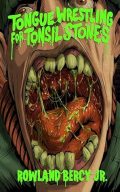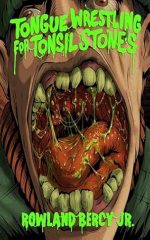
Tongue Wrestling for Tonsil Stones
When a peculiar medical condition caused Roger’s senses to do a switcheroo, almost overnight, he developed an unusual fixation – the distinct aroma and taste of tonsil stones. Thanks to his rare olfactory oddity syndrome Roger is willing do whatever necessary to amass a cache of coveted calcified throat nuggets. It was his dirty little secret, but hey, everyone has their kinks.
Tongue Wrestling for Tonsil Stones
When a peculiar medical condition caused Roger’s senses to do a switcheroo, almost overnight, he developed an unusual fixation – the distinct aroma and taste of tonsil stones. Thanks to his rare olfactory oddity syndrome Roger is willing do whatever necessary to amass a cache of coveted calcified throat nuggets. It was his dirty little secret, but hey, everyone has their kinks.
Trapped In the Throat of Desire: A Taste for Tonsil Stones
Rowland Bercy Jr.’s Tongue Wrestling for Tonsil Stones is an offbeat, darkly humorous novel that delves into the peculiar obsession of Roger, a man whose life is turned upside down by an uncommon medical condition. Roger’s olfactory senses betray him, causing him to experience the scent and taste of what most find utterly repulsive—tonsil stones—in an entirely different, twisted way. This peculiar affliction, known as “olfactory oddity syndrome,” leads Roger down a strange, gross, and ultimately compelling journey that challenges the boundaries of human nature and the search for satisfaction in the most bizarre corners of existence.
In the world of medical anomalies and bizarre fixations, disgust and fascination often intersect, and Bercy leans into this intersection with unflinching detail. Tongue Wrestling for Tonsil Stones raises an important question: Why do certain things, like tonsil stones, provoke such disgust? And what does it say about someone who is immune—or even attracted—to such repulsion?
At its core, the disgust many people feel toward tonsil stones is rooted in their composition—dead cells, bacteria, and food debris congealing into calcified lumps. Their irregular, crumbly appearance and foul odor typically evoke an instinctive aversion, evolved to protect us from decay and pathogens. But in Roger’s case, Bercy flips this natural response upside down, presenting a character who finds beauty, pleasure, and desire in what most find revolting.
Roger’s condition could be seen as a metaphor for the way society views and judges certain “kinks” or obsessions. What society labels as grotesque, Roger embraces with an almost primal urge. Bercy uses this dichotomy to explore the human condition, pushing readers to consider the fine line between normalcy and deviance, and how far people are willing to go to indulge their fixations.
The novel plays on our sensory triggers. The very idea of tonsil stones is unsettling enough, evoking the sensation of something trapped, putrid, and decaying within the body. Bercy taps into this natural discomfort, building Roger’s obsession in ways that are both physically and psychologically claustrophobic. As Roger hoards and amasses his collection of these calcified throat nuggets, the reader is pulled into his skewed world, forced to reconcile with the fascination that underlies revulsion.
Beyond the gross-out factor, Tongue Wrestling for Tonsil Stones offers more than just shock value. It is, at its heart, a nuanced examination of taboo desires and how we navigate the quirks of our psyche in a society that demands conformity. Roger’s “dirty little secret” is a symbol of what many of us hide beneath the surface—our own eccentricities, compulsions, or hidden attractions that defy societal norms.
Bercy’s writing is sharp, weaving elements of body horror with absurdist humor. He never shies away from the grotesque, but he tempers it with a sly wit that makes Roger’s journey oddly relatable, even as the character delves deeper into a fixation most would recoil from. Roger’s internal monologues are laced with dark humor, which allows the reader to remain engaged, even as the subject matter veers into the bizarre. You find yourself rooting for him, despite how deeply unsettling his desires become.
The novel’s exploration of human disgust versus personal obsession pushes readers to consider why we feel so repulsed by tonsil stones—and what it means when one person’s disgust becomes another’s delight. The pungent aroma of tonsil stones, which Roger finds intoxicating, is a clever metaphor for the subjectivity of desire and revulsion. Bercy plays with this subjectivity, asking readers to reflect on their own limits of what is acceptable or pleasurable.
In a broader sense, Tongue Wrestling for Tonsil Stones taps into deeper themes about the human body and the often uneasy relationship we have with its functions. Roger’s condition highlights the body as both a site of fascination and horror, where the lines between pleasure and disgust blur in strange and unexpected ways. Bercy encourages readers to face their discomfort head-on, using Roger’s story as a vehicle to explore the tension between our physicality and our psychological responses to it.
Ultimately, Tongue Wrestling for Tonsil Stones is not just a gross-out novella—it’s a smart, darkly comedic exploration of human fixation, pleasure, and the quirks of perception. Rowland Bercy Jr. has crafted a unique tale that dares readers to question what disgusts us and why. For those with a strong stomach and a curiosity for the weird and unusual, this book will undoubtedly satisfy.
Bercy’s bold narrative style in Tongue Wrestling for Tonsil Stones challenges societal boundaries around taboo desires. By taking something as mundane—and disgusting—as tonsil stones and turning it into a focal point of obsession, he provokes readers to reconsider their own instinctive reactions to what is gross or taboo. Roger’s journey is both disturbing and thought-provoking, reminding us that within every dark corner of the human psyche lies a reflection of our most primal urges. For those willing to venture into the bizarre, Tongue Wrestling for Tonsil Stones is an oddly compelling read that will leave you questioning the fine line between disgust and desire.

